C++ 11 异步编程
std::thread (C++创建线程)
| 函数 | |
|---|---|
| thread() noexcept | 创建一个线程,什么也不做 |
| template <class Fn, class... Args> | |
| explicit thread(Fn&& fn, Args&&... args) | 创建一个线程,以args为参数,执行fn函数 |
| thread(const thread&) = delete | 复制购置函数 |
| thread(thread&& x) noexcept | 移动购置函数 |
| ~thread() | 析构函数 |
| void join() | 等待线程结束并清理资源(会阻塞) |
| bool joinable() | 返回线程是否可以joinable |
| void detach() | 将线程与调用其的线程分离,彼此独立执行(此函数必须在线程创建时立即调用,且调用此函数会使其不能被join) |
| thread& operator=(thread &&rhs) | 移动赋值函数 |
例子:
cpp
#include <iostream>
#include <thread>
#include <mutex>
using namespace std;
std::mutex mtx;
void thread_p(int a, int b)
{
mtx.lock();
cout <<"thread id:"<< std::this_thread::get_id()<< " a:" << a << "b: " << endl;
mtx.unlock();
}
int main()
{
std::thread t1(thread_p, 1,2), t2(thread_p, 3,4);
cout << "t1.joinabel(): " << t1.joinable()<<endl;
t1.join();
cout << "t1.joinabel(): " << t1.joinable() << endl;
t2.detach();
cout << "t2.joinabel(): " << t2.joinable() << endl;
return 0;
}运行结果:

std::future
thread对象,它是C++11中提供异步创建多线程的工具。但是我们想要从线程中返回异步任务结果,一般需要依靠全局变量;从安全角度看,有些不妥;为此C++11提供了std::future类模板,future对象提供访问异步操作结果的机制,很轻松解决从异步任务中返回结果。
| 函数 | 解释 |
|---|---|
| void wait() const; | 等待值返回 |
| template< class Rep, class Period >std::future_status wait_for( const std::chrono::duration<Rep,Period>& timeout_duration ) const; | 等待多长时间 |
| template< class Clock, class Duration >std::future_status wait_until( const std::chrono::time_point<Clock,Duration>& timeout_time ) const; | 等待到多久之后返回 |
| get | 会一直阻塞直到拿到结果 |
| bool valid() const noexcept; | 检查 future 是否引用共享状态。 |
cpp
#include <iostream>
#include <future>
#include <thread>
using namespace std;
int main()
{
std::future<int> f;
cout << f.valid() << endl;
std::future<int> v = std::async([] {std::this_thread::sleep_for(std::chrono::milliseconds(1000)); return 8; });
std::future_status status = v.wait_for(std::chrono::microseconds(2000));
switch (status)
{
case std::future_status::deferred:
std::cout << "deferred\n";
break;
case std::future_status::timeout:
std::cout << "timeout\n";
break;
case std::future_status::ready:
std::cout << "ready!\n";
break;
}
cout << v.valid() << endl;
cout << v.get() << endl;
cout << v.valid() << endl;
return 0;
}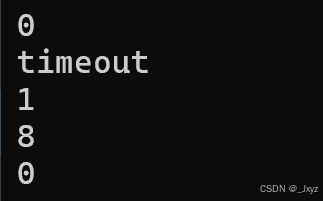
std::promise
std::promise 是C++11并发编程中常用的一个类,常配合std::future使用。其作用是在一个线程t1中保存一个类型typename T的值,可供相绑定的std::future对象在另一线程t2中获取。
https://en.cppreference.com/w/cpp/thread/promise
| 函数 | |
|---|---|
| get_future | 获取一个futrue对象 |
| set_value | 设置值 |
cpp
#include <iostream>
#include <future>
void thread1(std::promise<int> &p)
{
std::this_thread::sleep_for(std::chrono::milliseconds(500));
std::cout << "thread1 set data" << std::endl;
p.set_value(1);
}
void thread2(std::future<int>& p)
{
int data = p.get();
std::cout << "thead2 read data:" <<data << std::endl;
}
int main()
{
using namespace std;
std::promise<int> p;
std::future<int> f = p.get_future();
std::thread t1(thread1, std::ref(p));
std::thread t2(thread2, std::ref(f));
t1.join();
t2.join();
return 0;
}结果:

std::async
由于std::thread不能很方便的获取线程运行完之后的返回值
https://en.cppreference.com/w/cpp/thread/async
| template< class F, class... Args >/* see below */ async( F&& f, Args&&... args ); | 立即执行 |
| template< class F, class... Args >/* see below */ async( std::launch policy, F&& f, Args&&... args ); | 可以设置延迟和立即执行状态 |
| std::launch::async | 立即执行 |
| std::launch::deferred | 延迟执行 |
不接收返回值会先阻塞
不接收放回值相当于std::thread语句后面立即join会阻塞当前线程执行完然后执行下一个线程。
cpp
#include <iostream>
#include <thread>
#include <future>
using namespace std;
int main()
{
std::async([] {
for (int i = 0; i < 5; i++)
{
cout << "thead 1:" << i<< endl;
}
});
std::async([] {
for (int i = 0; i < 5; i++)
{
cout << "thead 2:" << i << endl;
}
});
return 0;
}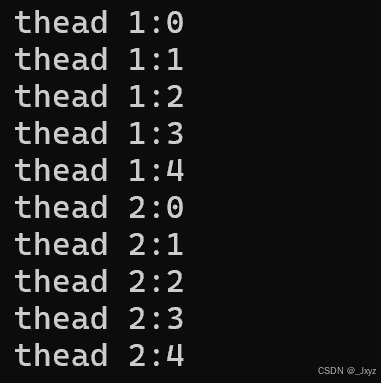
接收返回值才不会直接阻塞
cpp
#include <iostream>
#include <thread>
#include <future>
using namespace std;
int main()
{
std::future<void> r1= std::async([] {
for (int i = 0; i < 5; i++)
{
cout << "thead 1:" << i<< endl;
}
});
std::async([] {
for (int i = 0; i < 5; i++)
{
cout << "thead 2:" << i << endl;
}
});
return 0;
}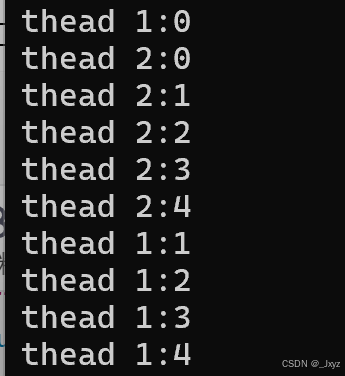
std::launch::deferred 延迟加载
只有当wait、get结果才会执行
cpp
#include <iostream>
#include <thread>
#include <future>
using namespace std;
int main()
{
std::future<void> r1= std::async(std::launch::deferred,[] {
for (int i = 0; i < 5; i++)
{
cout << "thead 1:" << i<< endl;
}
});
std::async([] {
for (int i = 0; i < 5; i++)
{
cout << "thead 2:" << i << endl;
}
});
return 0;
}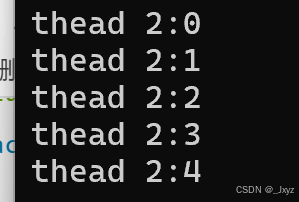
cpp
#include <iostream>
#include <thread>
#include <future>
using namespace std;
int main()
{
std::future<void> r1= std::async(std::launch::deferred,[] {
for (int i = 0; i < 5; i++)
{
cout << "thead 1:" << i<< endl;
}
});
std::async([] {
for (int i = 0; i < 5; i++)
{
cout << "thead 2:" << i << endl;
}
});
r1.get();
return 0;
}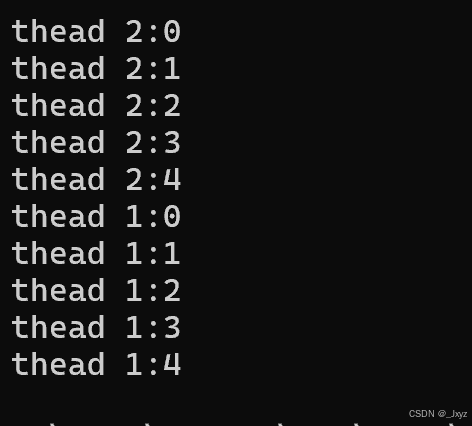
总结
| std::future | 一个未来值,可以先赋值,来源可以是std::promise的set_value之后,或者是std::async的返回值 |
| std::promise | 和std::future结合可以从一个线程中回去另一个线程的值。 |
| std::async | 创建线程、需要获取返回值std::future对象,不然会直接阻塞。并且可以指定,std::launch::async立即执行std::launch::deferred延迟执行,延迟执行只有wait future对象或get future对象的之后才会执行 |